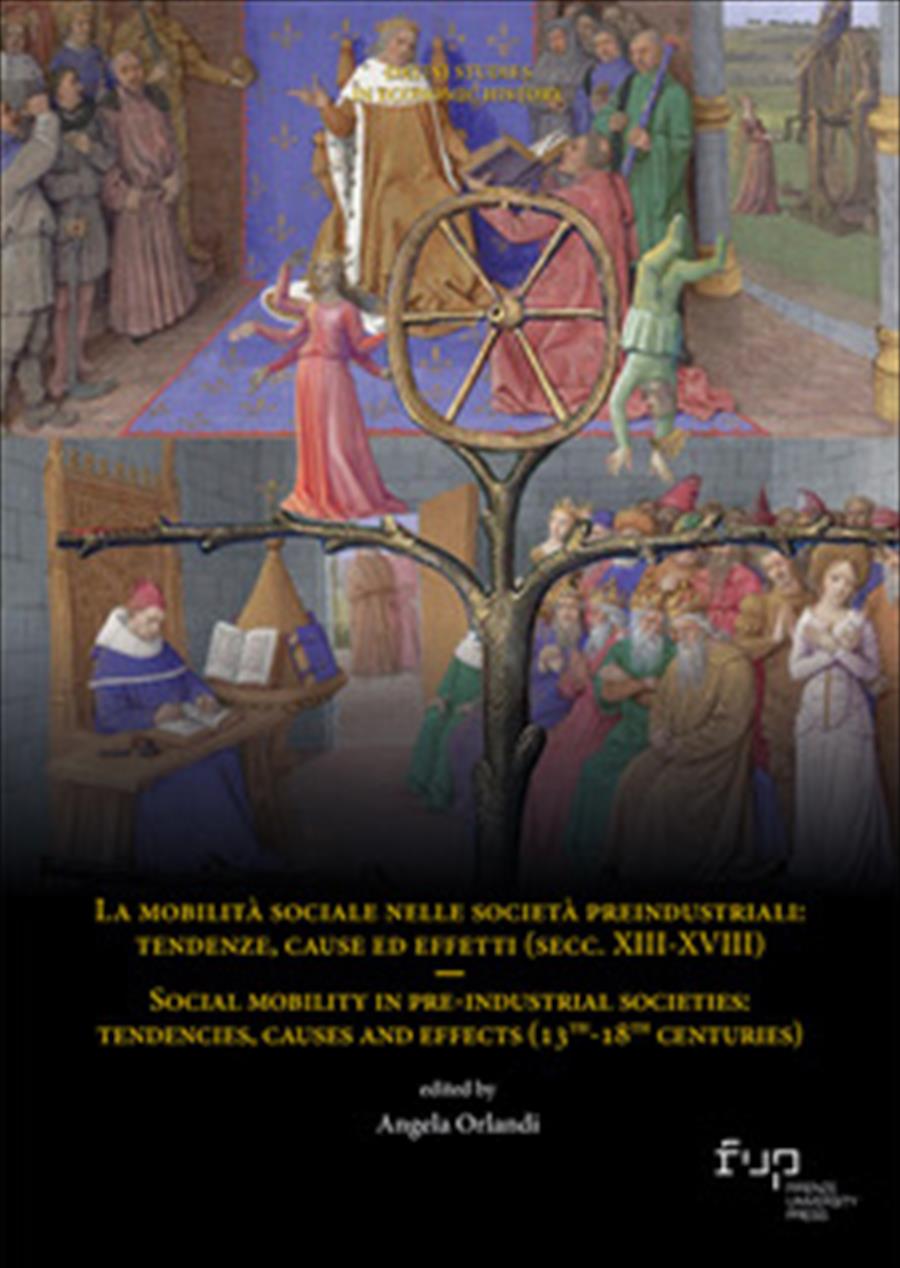Female social mobility in an impartible inheritance society at the end of the pre-industrial era (north-eastern Catalonia, 1750-1825)
- Josep Mas-Ferrer
- © 2025 Author(s) |
- CC BY 4.0
- DOI: 10.36253/979-12-215-0667-9.26
This paper aims to contribute to the study of female social mobility through marriage, by presenting a study case for north-eastern Catalonia, during the second half of the 18th century. This is a region where there was a strong system of impartible inheritance based on male primogeniture, so that it was women who moved into the families of the heirs, while paying a dowry accordingly. It is precisely the combination of the value of the dowry with the occupation of the bride's and groom's family that permits to better understand the dynamics of social mobility that brides experienced at the time of marriage. The results obtained suggest that male primogeniture pushed many women towards downward social mobility, despite certain mechanisms to mitigate it.
- Keywords:
- Social mobility,
- Inheritance systems,
- Marriages,
- Dowries,
University of Girona, Spain - ORCID: 0000-0002-5382-5263
- Alfani, Guido. 2021. “Economic inequality in preindustrial times: Europe and beyond.” Journal of Economic Literature 59: 3-44.
- Boberg-Fazlic, Nina, and Paul Sharp. 2018. “North and south: long-run social mobility in England and attitudes toward welfare.” Cliometrica 12: 251-76. DOI: 10.1007/s11698-017-0160-2
- Brea-Martinez, Gabriel, and Joana Maria Pujadas-Mora. 2022. Inequality in social mobility in Southern Europe. Evidence of Class Ceiling in the area of Barcelona, 16th-19th centuries. DOI: 10.31219/osf.io/74qr9
- Clark, Gregory, and Neil Cummins. 2014. “Surnames and social mobility in England, 1170–2012.” Human Nature 25: 517-37. DOI: 10.1007/s12110-014-9219-y
- Congost, Rosa, and Rosa Ros. 2013. “Change in society, continuity in marriage: an approach to social dynamics through marriage contracts (Catalonia, 1750-1850).” Continuity and Change 28, 2: 273-306.
- Congost, Rosa, Gabriel Jover, and Giuliana Biagioli. 2003. L’organització de l’espai rural a l’Europa Mediterrània. Masos, possessions, poderi. Girona: Associació d’Història Rural de les Comarques Gironines.
- Congost, Rosa, Rosa Ros, and Enric Saguer. 2016. “Beyond Life Cycle and Inheritance Strategies: The Rise of a Middling Social Group in an Ancien Régime Society (Catalonia, Eighteenth Century).” Journal of Social History 49, 3: 61746. DOI: 10.1093/jsh/shv056
- Congost, Rosa. 1991. Els propietaris i els altres. Vic: Eumo.
- De Moor, Tine, and Jan Luiten Van Zanden. 2010. “Girl power: the European marriage pattern and labour markets in the North Sea region in the late medieval and early modern period.” The economic history review 63, 1: 1-33. DOI: 10.1111/j.1468-0289.2009.00483.x
- Dennison, Tracy, and Sheilagh Ogilvie. 2014. “Does the European marriage pattern explain economic growth?” The journal of economic history 74, 3: 651-93.
- Feliu, Gaspar. 1991. Precios y salarios en la Cataluña moderna. Madrid: Banco de España.
- Ferrer, Llorenç. 2007. “Una revisió del creixement demogràfic de Catalunya en el segle XVIII a partir dels registres parroquials.” Estudis d’Història Agrària 20: 17-68.
- Hajnal, John. 1965. “European Marriage Patterns in Perspective.” In Population in History: Essays in Historical Demography, 101-43. London: Arnold.
- Humphries, Jane, and Carmen Sarasúa. 2012. “Off the record: reconstructing women's labor force participation in the European past.” Feminist Economics 18, 4: 39-67. DOI: 10.1080/13545701.2012.746465
- Jackson, Trevor. 2022. “The New History of Old Inequality.” Past and Present 259: 262-89. DOI: 10.1093/pastj/gtac009
- Le Bris, David, and Ronan Tallec. 2023. “The European marriage pattern and the sensitivity of female age at marriage to economic context. Montesquieu-Volvestre, 1660–1789.” Cliometrica, 17, 2: 187–231.
- Lluch, Rosa, and Elvis Mallorquí. 2015. “The Mas in the middle ages. Origins and evolution.” In The Catalan Mas. Origins, transformations and the end of an agrarian System, ed. Rosa Congost, 25-53, Girona: Associació d’Història Rural de les Comarques Gironines.
- Marfany, Julie. 2006. “Choices and constraints: marriage and inheritance in eighteenth- and early-nineteenth-century Catalonia.” Continuity and Change 21, 1: 73-106.
- Mas-Ferrer, Josep. 2023a. “In search of the ideal husband. Could inequality in the pre-industrial era be measured through dowries? North-eastern Catalonia, 1750-1825.” Investigaciones De Historia Económica 19, 3: 25–37. DOI: 10.33231/j.ihe.2023.03.001
- Mas-Ferrer, Josep. 2023b. Les desigualtats socials a la Catalunya preindustrial. L’estudi de cas de la Selva Interior, c.1750-1825. PhD Thesis, University of Girona.
- Piketty, Thomas. 1995. “Social mobility and redistributive politics.” The Quarterly journal of economics 110, 3: 551-84.
- Scheidel, Walter. 2017. The great leveler: violence and the history of inequality from the Stone Age to the twenty-first century. Princeton: Princeton.
- Schifano, Sonia. 2022. Economic Inequality and Social Mobility: challenges of the past and the present. PhD dissertation. Université du Luxembourg.
- To, Lluís. 1997. Família i hereu a la Catalunya nord-oriental (segles X-XII). Barcelona: Publicacions de l’ Abadia de Montserrat.
- Tocqueville, Alexis. 1835. De la démocratie en Amérique. Paris: Librairie de Charles Gosselin.
- Van Leeuwen, Marco H. D., and Ineke Maas. 2011. Hisclass. A historical international social class scheme. Leuven: Leuven University Press.
- Van Leeuwen, Marco H. D., Ineke Maas, Danièle Rébaudo, and Jean-Pierre Pélissier. 2016. “Social mobility in France 1720–1986: Effects of wars, revolution and economic change.” Journal of Social History 49, 3: 585-616. DOI: 10.1093/jsh/shv054
Informazioni sul capitolo
Titolo del capitolo
Female social mobility in an impartible inheritance society at the end of the pre-industrial era (north-eastern Catalonia, 1750-1825)
Autori
Josep Mas-Ferrer
Lingua
English
DOI
10.36253/979-12-215-0667-9.26
Opera sottoposta a peer review
Anno di pubblicazione
2025
Copyright
© 2025 Author(s)
Licenza d'uso
Licenza dei metadati
Informazioni bibliografiche
Titolo del libro
La mobilità sociale nelle società preindustriali: tendenze, cause ed effetti (secc. XIII-XVIII) / Social mobility in pre-industrial societies: tendencies, causes and effects (13th-18th centuries)
Curatori
Angela Orlandi
Opera sottoposta a peer review
Numero di pagine
612
Anno di pubblicazione
2025
Copyright
© 2025 Author(s)
Licenza d'uso
Licenza dei metadati
Editore
Firenze University Press
DOI
10.36253/979-12-215-0667-9
ISBN Print
979-12-215-0666-2
eISBN (pdf)
979-12-215-0667-9
eISBN (xml)
979-12-215-0668-6
Collana
Datini Studies in Economic History
ISSN della collana
2975-1241
e-ISSN della collana
2975-1195
